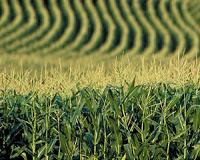 |
Pullman WA (SPX) May 06, 2011 A group of leading scientists, economists and farmers is calling for a broad shift in federal policies to speed the development of farm practices that are more economically, socially, and environmentally sustainable. Writing in the journal Science, they say current policies focus on the production of a few crops and a minority of farmers while failing to address farming's contribution to global warming, biodiversity loss, natural resource degradation, and public health problems. "We have the technology and the science right now to grow food in sustainable ways, but we lack the policies and markets to make it happen," says John Reganold, a Washington State University soil scientist and the Science paper's lead author. Starting in the late 1980s, Reganold pioneered several widely cited side-by-side comparisons showing organic farming systems were more earth-friendly than conventional systems while producing more nutritious and sometimes tastier food. His Science co-authors include more than a dozen other leading soil, plant, and animal scientists, economists, sociologists, agroecologists and farmers. The Science paper grows out of several national efforts to address concerns about farming's impact on the environment, including the landmark 1989 National Research Council report, Alternative Agriculture, which recommended greater research and education efforts into sustainable farming. All the authors of the Science paper wrote the council's 2010 update, Toward Sustainable Agricultural Systems in the 21st Century. The paper is particularly critical of the Farm Bill, which is slated for renewal next year. While only one-third of farmers receive payments under the bill, it has an outsized influence on production. It does little to promote sustainability, write the authors, while "distorting market incentives and making our food system overly dependent on a few grain crops mainly used for animal feed and highly processed food, with deleterious effects on the environment and human health." Environmental impacts, says Reganold, include overdrawn aquifers, eroded soil and polluted water. Meanwhile, he says, agricultural research and the field of "agroecology," which adapts the principles of nature to farming systems, are finding new ways to grow abundant and affordable food while protecting the environment, helping farm finances, and contributing to the well-being of farmers, farm workers and rural communities. Consumers-whose concerns range from farm working conditions to animal welfare to food safety-are seeking out organic and alternatively grown foods at grocery stores, farmer's markets, food coops, Community Supported Agriculture networks, and large outlets like Trader Joe's, Whole Foods, even Costco. The mounting environmental impacts of agriculture call for a transformation that can be sped up by shifting federal support to research, policies and markets that support more benign alternative farming systems. "We need to move more quickly," says Reganold. "Why are we supporting big, mainstream agriculture that's not necessarily protecting or benefiting the environment? Why don't we support innovative farming systems of all sizes that produce food sustainably?"
Share This Article With Planet Earth
Related Links Washington State University Farming Today - Suppliers and Technology
 Seed Mixtures And Insurance Pest Management Are Future Norm In The Corn Belt
Seed Mixtures And Insurance Pest Management Are Future Norm In The Corn BeltChicago IL (SPX) May 06, 2011 As the use of biotechnology increases and more companies move forward with the U.S. Environmental Protection Agency's approval to begin full-scale commercialization of seed mixtures in transgenic insecticidal corn, many researchers believe pest monitoring will become even more difficult. "Seed mixtures may make insect resistance management (IRM) risky because of larval behavior and greater ... read more |
|
| The content herein, unless otherwise known to be public domain, are Copyright 1995-2010 - SpaceDaily. AFP and UPI Wire Stories are copyright Agence France-Presse and United Press International. ESA Portal Reports are copyright European Space Agency. All NASA sourced material is public domain. Additional copyrights may apply in whole or part to other bona fide parties. Advertising does not imply endorsement,agreement or approval of any opinions, statements or information provided by SpaceDaily on any Web page published or hosted by SpaceDaily. Privacy Statement |